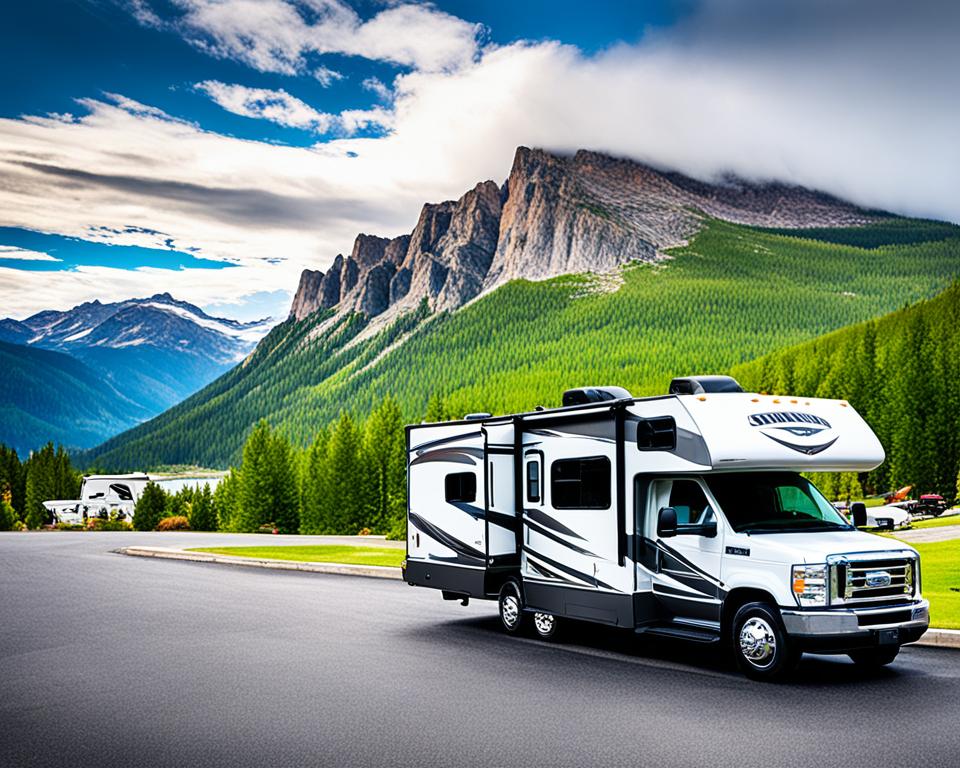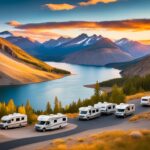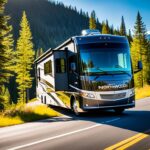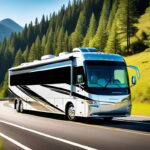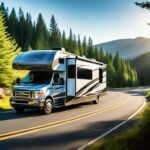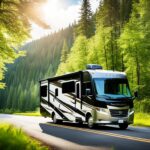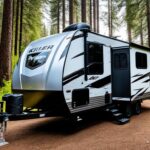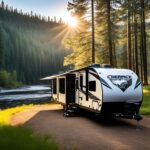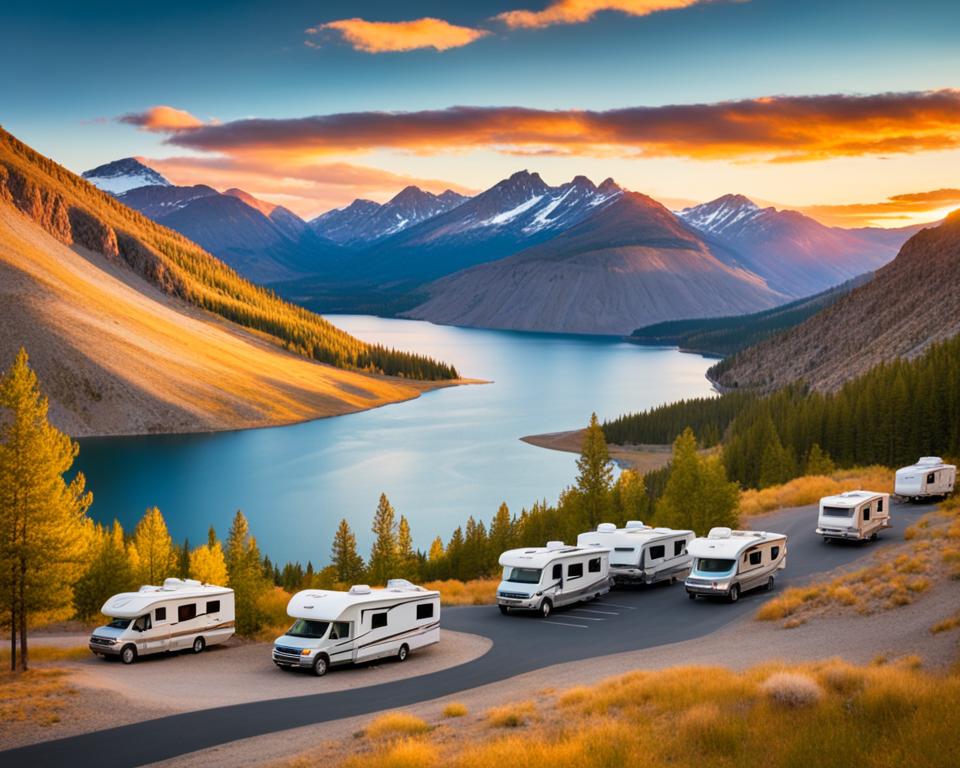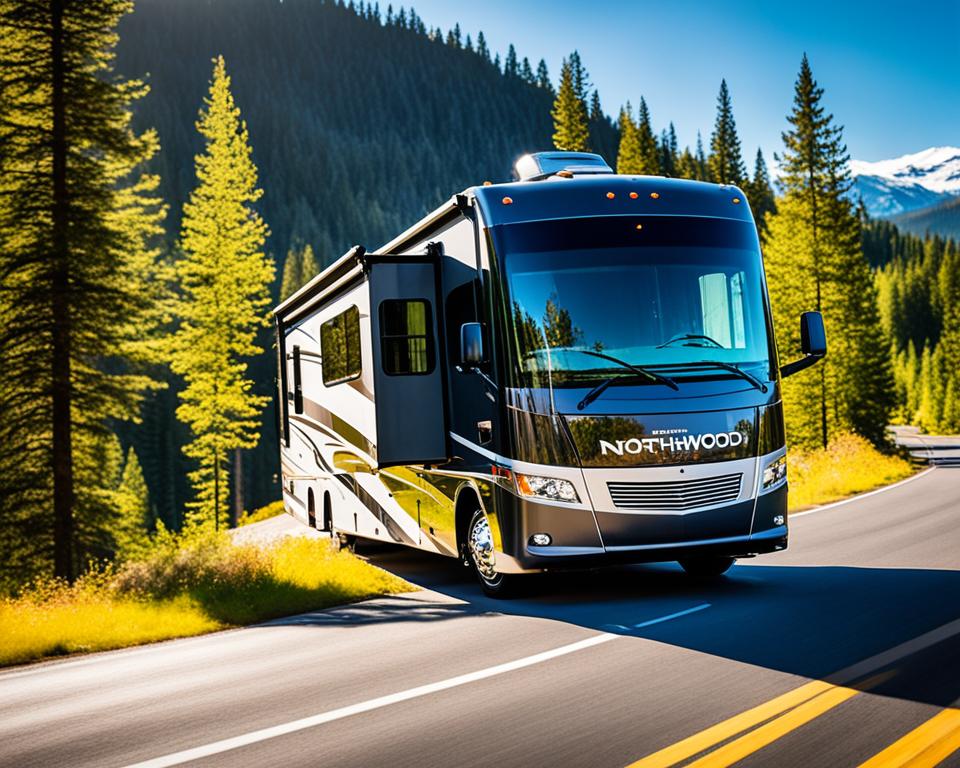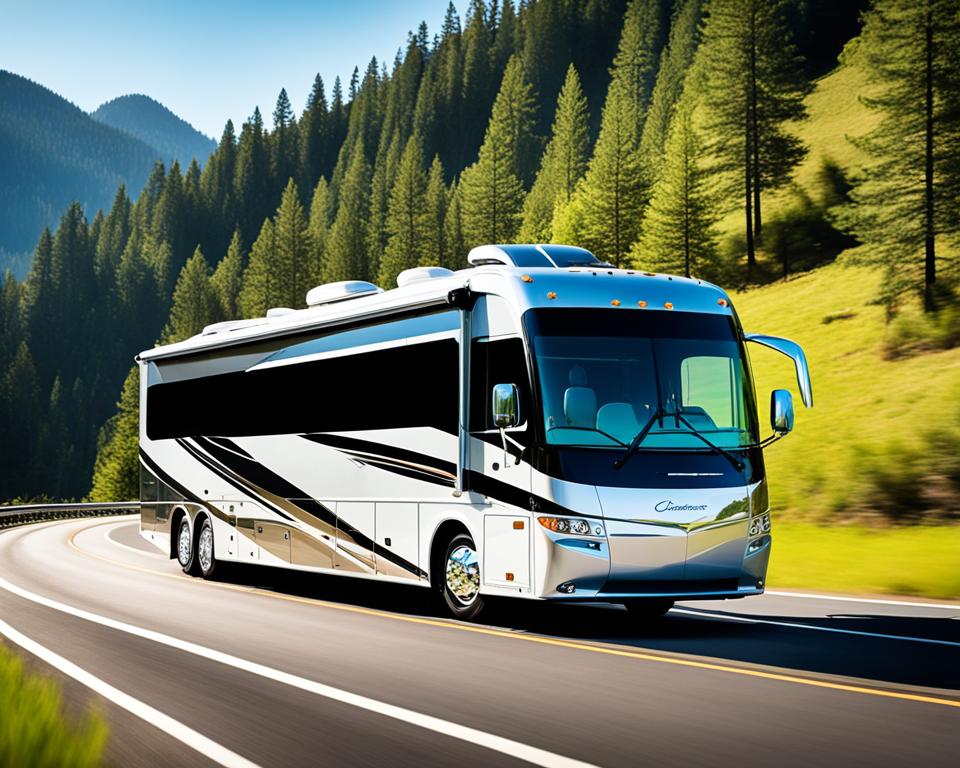Owning an RV can be a rewarding experience, but it’s important to ensure that you have the right RV insurance policy to protect your investment and provide the coverage you need. Whether you have a motorhome, camper, travel trailer, or fifth wheel, there are insurance options available to suit your needs. Getting a quote for RV insurance is quick and easy. Just call 1-877-669-6877 or find an agent online.
Key Takeaways:
- RV insurance provides coverage and protection for your recreational vehicle, regardless of whether it’s a motorhome, camper, travel trailer, or fifth wheel.
- Getting a quote for RV insurance is a simple process, either by calling 1-877-669-6877 or connecting with an agent online.
- It’s essential to have the right RV insurance policy to ensure you have the coverage you need in case of accidents, theft, or damage.
- RV insurance also often includes liability coverage, which provides peace of mind while you’re on the road and is crucial for protecting you financially.
- Speak with an agent to customize your RV insurance policy to fit the unique features and needs of your vehicle.
Why is RV Insurance Important?
RV insurance is crucial for protecting your home on wheels. Just like car insurance, RV insurance provides coverage in case of accidents, theft, or damage. It also often includes liability coverage, which is essential for your peace of mind while you’re out exploring the open road. Without proper insurance, you could be financially responsible for any damages or injuries that occur while using your RV.
Accidents can happen anywhere, and owning an RV comes with its own set of unique risks. Whether you’re driving on the highway or parked at a campsite, you want to ensure that you have the necessary protection in place. RV insurance offers coverage for a range of potential incidents, so you can enjoy your travels worry-free.
When you invest in an RV, you want to protect it from theft and damage as well. Your RV represents a significant financial investment, and without insurance coverage, you could be left with a hefty bill in the event of a break-in, vandalism, or a natural disaster. Additionally, RV insurance policies can also cover personal belongings inside the vehicle, providing added peace of mind.
Liability coverage is also an important aspect of RV insurance. This coverage is designed to protect you in the event that you cause injury to someone else or damage their property while using your RV. Without liability coverage, you may be held personally responsible for medical expenses, legal fees, and other costs associated with an accident.
Overall, RV insurance provides you with the protection and coverage you need to enjoy your adventures on the road. It safeguards your investment, offers financial security in case of accidents or damages, and gives you peace of mind knowing that you’re covered.
Types of RVs Covered
RV insurance policies offer coverage for various types of vehicles, ensuring that owners of different RVs can find suitable protection. Whether you own a motorhome, camper, travel trailer, or even a pop-up, there are insurance options available to tailor your policy based on the unique features of your RV or camper.
Motorhomes:
Motorhomes, also known as Class A, B, or C RVs, are self-propelled vehicles with living space integrated into the driving compartment. These RVs typically offer a range of features, such as kitchens, bathrooms, sleeping areas, and entertainment systems. RV insurance coverage for motorhomes can be customized to protect both the vehicle and its onboard amenities.
Campers:
Campers, also referred to as truck campers or slide-in campers, are removable living spaces designed to be loaded onto a pickup truck bed. They provide a compact and convenient option for those who prefer a smaller RV with basic amenities. RV insurance for campers can be tailored to include coverage for both the camper unit and the truck used for transportation.
Travel Trailers:
Travel trailers, also called towable trailers, are non-motorized RVs that are towed by a separate vehicle. These trailers come in various sizes and configurations, offering features such as kitchens, bathroom facilities, sleeping areas, and additional living spaces. RV insurance for travel trailers can be customized to protect both the trailer and its contents.
Pop-Ups:
Pop-up campers, also known as folding campers or tent trailers, are compact and lightweight RVs that fold down for easy storage and towing. These campers feature collapsible walls and roofs and often offer basic amenities like sleeping areas, small kitchens, and dinettes. RV insurance coverage for pop-ups can be tailored based on their unique features and value.
When selecting RV insurance, it’s crucial to work with an agent who understands the intricacies of different RV types and can help you tailor your policy to match your specific requirements. By finding the right coverage, you can enjoy peace of mind while traveling with your chosen RV.
| RV Type | Description |
|---|---|
| Motorhomes | Self-propelled RVs with integrated living space |
| Campers | Removable living spaces loaded onto pickup trucks |
| Travel Trailers | Non-motorized RVs towed by separate vehicles |
| Pop-Ups | Compact and lightweight folding campers |
Additional Coverage Options
In addition to standard RV insurance coverage, there are options for additional coverage to protect specialty vehicles like RVs and travel trailers. These enhanced coverages can provide added protection and peace of mind while you’re on the road.
One such coverage option is comprehensive RV insurance. This coverage protects your RV from non-collision incidents such as vandalism, fire, or natural disasters. With comprehensive RV insurance, you can have peace of mind knowing that you’re protected against unforeseen events that could damage your vehicle.
Another coverage option to consider is vacation liability insurance. This coverage provides liability protection when you’re using your RV as a temporary residence, such as when you’re parked at a campground. It can help cover medical expenses or property damage in case someone gets injured or their property is damaged while on your RV.
For those who enjoy traveling with valuable items, specialized personal effects coverage is available. This coverage provides protection for personal belongings on board your RV, such as electronics, jewelry, and sporting equipment.
Protection on the Road
RV insurance providers also offer roadside assistance coverage for those unexpected breakdowns. With this coverage, you can get help with services like towing, lockout assistance, and fuel delivery, ensuring that you’re not left stranded on the side of the road.
Additionally, some insurance companies offer full-timer coverage for those using RVs as their primary residence. This coverage provides similar benefits to a homeowners insurance policy and includes protection for your belongings, liability coverage, and additional living expenses in case your RV becomes uninhabitable.
Insurance Quote: “Don’t wait until it’s too late. Get the enhanced coverages you need for your specialty vehicle today and hit the road with confidence.”
To learn more about these options and how they can benefit you, reach out to an RV insurance specialist. They can help you customize your coverage to fit your unique needs and ensure that you have the protection you require for your RV adventures.
Factors Affecting RV Insurance Costs
The cost of RV insurance can vary depending on several factors. Understanding these factors will help you make informed decisions when purchasing your RV insurance policy. Here are the key factors to consider:
State Insurance Requirements
Each state has its own insurance requirements for RV owners. These requirements often include minimum liability coverage limits that you need to meet. It’s essential to understand the specific insurance requirements in your state to ensure compliance and avoid any penalties.
Driving History
Your driving history plays a role in determining your RV insurance costs. Insurance companies consider factors such as accident history and traffic violations when assessing your risk profile. Having a clean driving record can help lower your insurance premiums, while a history of accidents or violations may result in higher costs.
Specific Needs
Your unique needs and circumstances will impact your RV insurance costs. Consider factors like the value of your RV, the level of coverage you desire, and any additional optional coverages you may need. Understanding your needs and discussing them with an agent will help you select the right policy that fits your budget.
Deductibles
The deductible is the amount you agree to pay out of pocket before your insurance coverage kicks in. Choosing a higher deductible can lower your insurance premiums but also means you’ll have to pay more in the event of a claim. Assess your financial situation and risk tolerance to determine the deductible that works best for you.
Liability Limits
Liability coverage protects you in case you’re at fault in an accident that causes property damage or bodily injury to others. The liability limits you choose will impact your insurance costs. Higher liability limits provide greater protection but also result in higher premiums. Consider your assets and potential financial risks when determining the appropriate liability limits for your RV insurance policy.
By considering these factors and discussing them with an experienced insurance agent, you can obtain an accurate quote tailored to your specific circumstances. Having a clear understanding of these factors will help you make informed decisions and find the right RV insurance policy that meets your needs and budget.
Getting the Best RV Insurance Rates
When it comes to RV insurance, finding the best rates is essential. Here are some strategies to help you lower your RV insurance rates and customize your policy to fit your needs:
1. Safe Storage
Storing your RV in a safe and secure location can significantly reduce the risk of theft or damage. Insurance companies often offer lower rates for RVs that are kept in a secure storage facility or on your private property with proper security measures in place.
2. Customizing Your Policy
One way to lower your rates is by customizing your insurance policy based on how you plan to use your RV. If you only use it for occasional trips, you may be able to adjust your coverage and usage limits to reflect this, resulting in lower premiums. Speak with your insurance agent to determine the best options for your specific situation.
3. Adjusting Your Deductible
Another way to find a balance between coverage and cost is by adjusting your deductible. A higher deductible typically leads to lower premiums, but it’s essential to ensure you can comfortably afford the deductible in case of a claim. Consider your financial situation and the value of your RV when deciding on the appropriate deductible amount.
By implementing these strategies and working with an experienced insurance agent, you can find the best RV insurance rates that align with your budget and provide you with the coverage you need.
| Tip | Description |
|---|---|
| 1 | Store your RV in a safe and secure location to lower the risk of theft or damage |
| 2 | Customize your policy based on your RV usage to adjust coverage and usage limits |
| 3 | Consider adjusting your deductible to find a balance between coverage and cost |
RV Insurance vs. Car Insurance
When it comes to insuring your recreational vehicle (RV) or camper, it’s important to understand the differences between RV insurance and car insurance. While both types of insurance provide coverage and protection, they differ in terms of the specific needs and risks associated with recreational vehicles.
RV insurance is designed to provide comprehensive coverage for your home on wheels. It takes into account the unique features and risks associated with RVs, ensuring that you have the right protection in place. Car insurance, on the other hand, is tailored specifically for automobiles and focuses on coverage for standard vehicles.
While some aspects of RV insurance and car insurance may overlap, such as liability coverage, there are significant differences in coverage options. RV insurance typically includes additional protections necessary for the unique lifestyle of RV owners, such as coverage for personal belongings, awnings, and attachments. It also provides coverage for risks specific to the RV, such as collision damage, comprehensive coverage, and emergency expense coverage.
A major difference between RV insurance and car insurance is the extended coverage and protection offered by RV insurance. RV owners often use their vehicles as both a means of transportation and a living space, which introduces additional risks and liabilities that are not typically associated with car ownership. RV insurance takes these factors into account and provides coverage to meet the specific needs of RV owners, ensuring full protection for their home on wheels.
Key Differences Between RV Insurance and Car Insurance:
| RV Insurance | Car Insurance |
|---|---|
| Comprehensive coverage tailored for RVs and campers | Standard coverage for automobiles |
| Protection for personal belongings, awnings, and attachments | Limited coverage for personal belongings |
| Additional coverage for collision, comprehensive, and emergency expenses | Basic coverage options |
| Liability coverage for both on-the-road and living space risks | Liability coverage for on-the-road accidents |
It’s important to have the right insurance policy to ensure that you are fully protected while enjoying the RV lifestyle. RV insurance provides the comprehensive coverage and protection you need for your home on wheels, covering both the unique risks associated with RVs and the standard risks associated with traveling on the road. By securing RV insurance, you can have peace of mind knowing that you are fully protected.
The Good Sam Insurance Agency
The Good Sam Insurance Agency is your go-to resource for comprehensive RV insurance coverage. As specialists in the RV industry, they understand the unique needs of RV owners and work with top insurance companies to create customized policies that meet your specific needs.
The Good Sam Insurance Agency offers coverage for a variety of RV types, including Class A, B, and C motorhomes, travel trailers, and pop-ups. Whether you’re embarking on a cross-country adventure or exploring your local surroundings, their licensed agents can help you find the perfect policy.
But their coverage doesn’t stop at your RV. The Good Sam Insurance Agency recognizes that your adventures may involve more than just your motorhome or trailer. That’s why they also offer coverage for additional belongings you may have with you on your travels, such as a tow vehicle, boat, ATV, and personal belongings. They provide complete lifestyle insurance to protect everything that enhances your RV experience.
Getting a quote and speaking with a licensed agent is easy. Simply visit the Good Sam Insurance Agency website or give them a call at 1-888-514-1116. Their team of knowledgeable professionals is ready to assist you in finding the perfect coverage for your RV and all your travel needs.
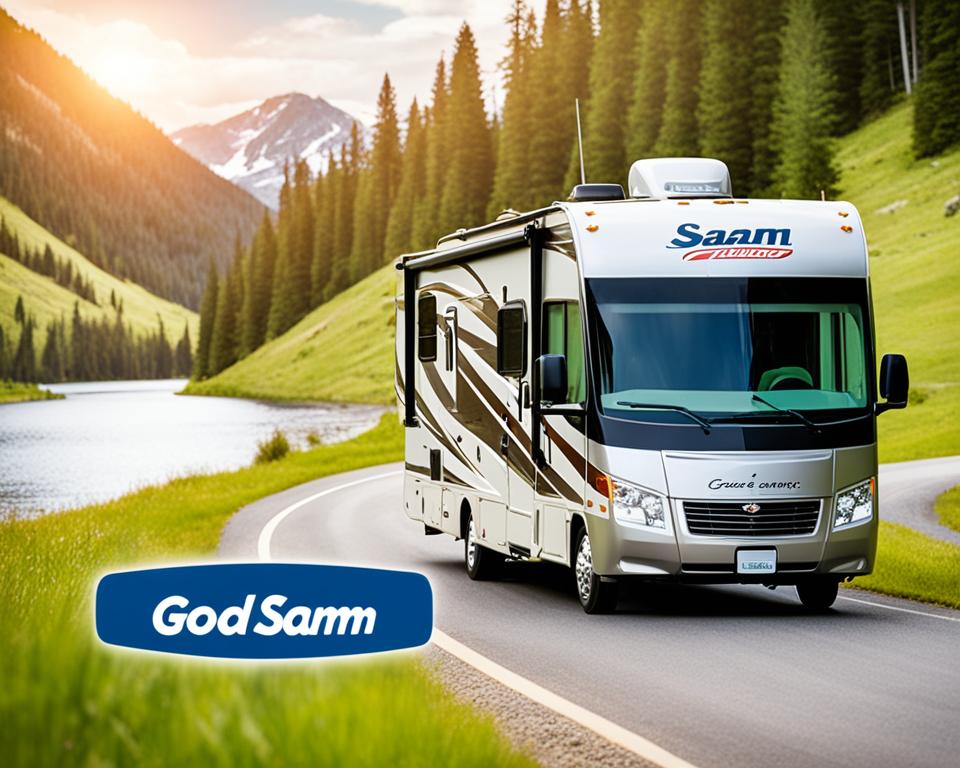
Choosing the Right RV Type
When it comes to choosing the right RV type, personal preference and specific needs play a crucial role. Consider whether you prefer a self-propelled motorhome or a towed travel trailer, as well as the weight capacity of your vehicle and the amount of space you require.
For those seeking the convenience of a self-propelled motorhome, options such as Class A, B, or C motorhomes provide a range of amenities and living space. These RVs are ideal for individuals or families who prioritize comfort and luxurious features.
On the other hand, if you prefer the flexibility of towing your RV with a separate vehicle, a travel trailer might be the perfect fit. Travel trailers offer various sizes and floor plans to accommodate your specific needs and preferences. Additionally, they can often be detached from the tow vehicle, allowing for more flexibility when exploring your destinations.
Weight capacity is another critical aspect to consider when choosing an RV. Be mindful of the towing capacity of your vehicle, ensuring that it can handle the weight of the RV you’re considering. This information can typically be found in the vehicle’s owner’s manual or by consulting with the manufacturer.
Space requirements are also a key consideration. Determine the number of people who will be using the RV and the amenities you desire. This will help you decide on the ideal size and layout, whether you opt for a motorhome or a travel trailer.
When making the decision, take your time to research and explore different models and options available in the market. Consider visiting RV dealerships or attending RV shows to gain firsthand experience and gather information.
Ultimately, choosing the right RV type is a personal decision that should align with your lifestyle and fulfill your unique needs. By considering factors such as personal preference, self-propelled or towed options, weight capacity, and space requirements, you can find the perfect RV that enhances your travel experiences.
| RV Type | Personal Preference | Needs | Benefits |
|---|---|---|---|
| Self-Propelled Motorhome | Comfort and luxurious features | More living space |
|
| Towed Travel Trailer | Flexibility and separate vehicle | Versatile floor plans |
|
RV Safety Tips
Ensuring the safety of your RV and its occupants should be a top priority. Follow these RV safety tips to protect yourself, your passengers, and your investment:
1. Regularly Check Your Tires
Your tires are one of the most critical components of your RV. Check them regularly for any signs of wear or damage. Make sure they are properly inflated according to the manufacturer’s recommendations. Underinflated or worn-out tires can lead to accidents and reduce fuel efficiency. Prioritize tire maintenance to keep your RV safe on the road.
2. Perform Routine Maintenance
Maintaining your RV is essential for safety and longevity. Regularly inspect and service your RV’s mechanical systems, including the engine, brakes, and suspension. Address any issues promptly to prevent potential accidents or breakdowns during your travels. By performing routine maintenance, you can prevent costly repairs and ensure a smooth and safe journey.
3. Sealant Inspection and Maintenance
Inspect the sealant on your RV’s roof, windows, and doors regularly. Cracked or damaged sealant can allow water to enter and cause structural damage over time. Make sure to reseal any areas that show signs of wear or deterioration. By maintaining the integrity of your RV’s sealant, you can prevent water leaks and maintain a weatherproof interior.
4. Secure Adequate RV Insurance
Having the right RV insurance is crucial for financial protection. In the event of an accident or liability issues on the road, comprehensive RV insurance can provide the coverage and peace of mind you need. Contact a reputable insurance provider to discuss your options and ensure you have sufficient coverage tailored to your specific RV and travel needs.
Follow these RV safety tips to enjoy your adventures with confidence and peace of mind. By prioritizing regular maintenance, tire care, and insurance coverage, you can enhance the safety and protection of your RV and ensure a worry-free journey.
Conclusion
RV insurance is a crucial investment for any recreational vehicle owner. It provides the coverage and protection you need to enjoy your travels with peace of mind. Whether you have a motorhome, camper, travel trailer, or fifth wheel, having the right insurance policy ensures that you are financially protected in case of accidents, theft, or damage. Additionally, RV insurance often includes liability coverage, which safeguards you from potential legal and financial troubles that may arise while on the road.
With the right RV insurance, you can confidently embark on your adventures, knowing that your investment is safeguarded. Whether you’re exploring national parks, camping by the beach, or traveling cross-country, having proper coverage ensures that unforeseen incidents won’t compromise your enjoyment. Don’t wait to protect your recreational vehicle – contact an RV insurance provider today to get the coverage you need to fully embrace the RV lifestyle.
Recreational vehicles are meant to bring joy and relaxation to your life. However, accidents can happen, and without the right insurance coverage, they can quickly turn into stressful and costly situations. By choosing a comprehensive RV insurance policy, you can protect yourself, your passengers, and your belongings, giving you the peace of mind you deserve. So, don’t delay – secure your recreational vehicle with the right insurance coverage and enjoy worry-free adventures on the open road.
FAQ
What is RV insurance?
RV insurance is a type of insurance policy that provides coverage for recreational vehicles, such as motorhomes, campers, travel trailers, and fifth wheels. It offers protection in case of accidents, theft, or damage, and typically includes liability coverage as well.
Why do I need RV insurance?
RV insurance is important because it helps protect your investment and provides coverage for accidents, theft, and damage. It also offers liability coverage, which is essential for your peace of mind while you’re on the road. Without proper insurance, you could be financially responsible for any damages or injuries that occur while using your RV.
What types of RVs are covered by insurance?
RV insurance policies can cover a wide range of vehicles, including motorhomes, campers, travel trailers, and even pop-up trailers. It’s important to speak with an agent to tailor your policy to the specific features of your RV or camper.
Are there additional coverage options for RV insurance?
Yes, there are additional coverage options available to protect specialty vehicles like RVs and travel trailers. These enhanced coverages can provide added protection and peace of mind while you’re on the road. It’s recommended to speak with an RV insurance specialist to learn more about these options and how they can benefit you.
What factors affect the cost of RV insurance?
The cost of RV insurance can vary based on several factors, including your state’s insurance requirements, your driving history, and your specific needs. The deductibles, liability limits, and coverage options you choose can also affect the total cost of your insurance policy. To get an accurate quote, it’s best to speak with an agent and provide them with the necessary details.
How can I get the best rates for RV insurance?
There are several ways to potentially lower your RV insurance rates. You can consider storing your RV in a safe and secure location to reduce the risk of theft or damage. Customizing your policy based on how you plan to use your RV and adjusting your deductible can also help you find a balance between coverage and cost. Speaking with an agent can provide you with guidance to find the best rates for your specific situation.
How is RV insurance different from car insurance?
While some aspects may be similar, such as liability coverage, RV insurance takes into account the unique needs and risks associated with recreational vehicles. It provides specific coverage for your RV or camper and ensures full protection for your home on wheels. It’s important to have the right insurance policy tailored specifically for your RV.
What is the Good Sam Insurance Agency?
The Good Sam Insurance Agency specializes in RV insurance and works with top insurance companies to create customized policies for Class A, B, or C motorhomes, travel trailers, and pop-ups. They also offer coverage for other belongings you may have with you on your travels, such as a tow vehicle, boat, ATV, and personal belongings. To get a quote and speak with a licensed agent, you can visit their website or call 1-888-514-1116.
How do I choose the right RV type?
Choosing the right RV type depends on your personal preferences and needs. Consider whether you prefer a self-propelled motorhome or a towed travel trailer, as well as the weight capacity of your vehicle and the amount of space you require. It’s important to find an RV that fits your lifestyle and meets your specific needs.
What are some RV safety tips?
To ensure a safe and enjoyable RV experience, it’s important to follow RV safety tips. This includes regularly checking your tires, keeping them properly inflated, and maintaining your RV with routine maintenance. Having RV insurance is also crucial for financial protection in case of accidents or liability issues on the road.
Why is RV insurance essential?
RV insurance is essential for protecting your investment and providing coverage for accidents, theft, and damage. It also offers liability coverage for your peace of mind while traveling. With the right RV insurance policy, you can enjoy your RV lifestyle with confidence, knowing that you’re protected on the road. Contact an RV insurance provider today to get the coverage you need.

